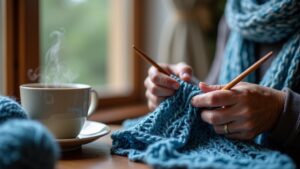Knitting offers more than just cozy scarves or warm blankets—it strengthens the brain in surprising ways. The steady, repetitive motions create a calming rhythm, lowering stress while keeping the mind engaged. This craft challenges memory, fine motor skills, and problem-solving, all of which help maintain sharp contemplation over time. And when done with others, it builds connections that boost mental health. How exactly does this simple hobby work such magic? The answers could just change how we view downtime.
The Flow State: Knitting’s Meditative Power
The rhythmic motion of knitting does more than create scarves or sweaters—it can quiet the mind. Many knitters describe slipping into a flow state, where the world fades and the mind and body sync with the repetitive stitches. This immersion in the present moment eases tension, sharpens focus, and can even lessen chronic pain by redirecting attention from discomfort to the soothing, steady rhythm of the craft.
Achieving this meditative-like state depends on finding the right balance between challenge and skill—too simple, and boredom might creep in; too complex, and frustration could take over. By fostering this mindful focus on the present, knitting becomes more than a hobby—it’s a gentle reset for an overstimulated brain. The deeper concentration it brings can also improve cognitive clarity long after the needles are put down.
Stress Reduction Through Repetitive Motion
- Mindful Focus: The rhythm of stitches shifts attention away from stressors, grounding the mind in the present moment.
- Physical Calm: Steady hand movements signal the body to relax, reducing muscle tension and promoting a meditative state.
- Social Connection: Whenever done in groups, knitting combats loneliness, adding a layer of emotional support to its stress-relieving effects.
Boosting Mental Wellbeing With Crafting
Many people find that crafting, like knitting, offers more than just a creative outlet—it actively supports mental wellbeing. The rhythmic motions in Knitting and Crocheting can ease stress, lowering blood pressure and heart rate.
For those struggling with anxiety or depression, the benefits of knitting include a tangible sense of accomplishment, lifting mood. The focused attention required gives the brain a break from daily stressors, acting like a mental reset.
Older adults, in particular, can find it helps maintain brain function while reducing loneliness when done socially. The cognitive demands of crafting also keep hands and minds agile, potentially delaying age-related decline.
Whether alone or in a group, these activities foster calm and connection, making them powerful tools for mental health.
Enhancing Cognitive Function and Memory
Engaging in knitting isn’t just about creating cozy scarves or soft blankets—it’s a workout for the brain too. The rhythmic, focused nature of knitting strengthens cognitive function and memory, offering benefits for both body and mind. Research suggests it can even help delay or reduce the risk of Alzheimer’s disease and mild cognitive impairment by keeping the brain active.
Mastering a new skill like knitting challenges the brain, fostering neural connections that support memory and problem-solving.
The repetitive yet precise movements improve hand-eye coordination, which is linked to better cognitive health.
Knitting’s meditative quality reduces stress, a known factor in cognitive decline, while keeping the mind sharp.
For those seeking to boost brain health, knitting is a simple, rewarding way to stay mentally engaged.
Social Engagement and Community Building
Knitting circles and online craft communities turn a solitary hobby into a way to connect with others. These social spaces help people bond over shared craft activities, fostering friendships and reducing isolation.
A knitting group, whether in-person or on social media, provides a sense of belonging, especially for those who may struggle to engage in other ways. Seniors in care facilities, for instance, often find these gatherings uplifting, as they combine creativity with conversation.
The act of knitting together encourages storytelling, skill-sharing, and mutual encouragement. Even virtual communities offer support, where members exchange patterns and celebrate finished projects. These interactions not only deepen social ties but also amplify the mental benefits of knitting.
Accessible Hobby for Lifelong Brain Health
- Boosts Mental Agility – Learning new stitches challenges memory and problem-solving skills.
- Lowers Stress – The repetitive motion calms the mind, easing anxiety.
- Encourages Social Connection – Joining knitting groups fosters engagement, further protecting cognitive function.
With resources like online tutorials and local clubs, knitting is easy to start. Whether alone or in company, it’s a small habit with big rewards for the brain.
Conclusion
Knitting weaves together mental clarity and calm, much like a cozy blanket wraps warmth around the body. Its rhythmic stitches sharpen focus while soothing stress, and the joy of creation lights up the brain. Whether working alone or in a group, this simple craft builds resilience against cognitive decline. Best of all, it’s an accessible tool—no fancy skills required—just yarn, needles, and a willingness to stitch a healthier mind.


